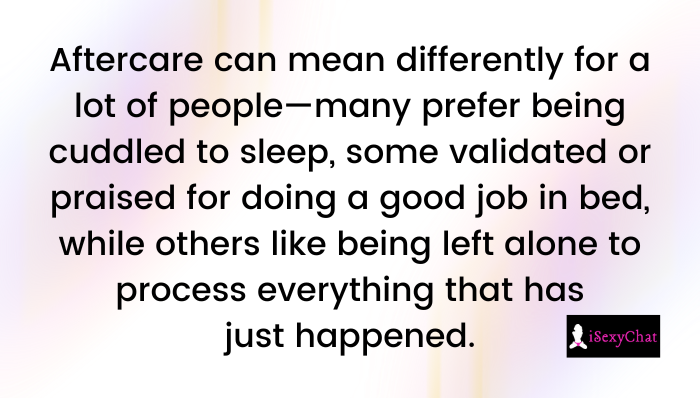For better or for worse, BDSM has slowly entered the mainstream in recent years. More intense sexual activities, kinks, and fetishes are no longer kept under covers like they used to.
However, one kink has been met with a backlash to no end. It’s been maligned not just in the BDSM community, but in the world of sex as a whole. Consensual non-consent (CNC)—or more controversially understood as rape play. Another less intimidating term for this is ravishment play.
Taboo as it may sound, a surprising 62% of women have actually reported fantasizing about having men using force in the bedroom. Even the most vanilla people you know could be hiding a CNC kink.
Whatever term you use, they mean the same as a spoken agreement of two partners willing to engage in forced sex such as sexual assault or even rape itself. It’s an extreme kind of power play in action, one where the dominant has full unadulterated control over another. You give consent to lose consent.
Call it immoral or unethical but there’s no denying this kink has a considerably large following in the BDSM community. There’s a lot to unpack when it comes to CNC, but it’s worth educating yourself on the do’s and don’ts of this misunderstood kink.
So, the question lingers: what is a CNC kink?
More Than Just Forced Sex
How CNC is enacted varies with each D/s relationship dynamic. However, there is an important distinction to be made here: not every CNC kink is rooted in rape play. Every rape play is CNC, but not every CNC is rape play.
Think of consensual non-consent as an umbrella term. All “forced” acts that occur in D/s relationships, including but not limited to blindfolding, groping, and tying up, are under CNC. It could also mean being manhandled or pushed way past the boundaries you set for yourself.
CNC is where trusting partners come to play and immerse themselves in dangerous roles that would not be safe in real life. We don’t recommend new people getting into kink for the first time to dive right into CNC. That is unless they have some prior BDSM experiences already.
It’s also worth stressing that CNC isn’t just a harsher variation of a brat. A brat is a type of submissive that enjoys being forced to do what is instructed. On the other hand, subs engaged in CNC don’t actually like what’s being done to them—they don’t consent to it—but they follow through as discussed anyway. Brats thrive on being stubborn for the sake of challenging or teasing the dom as part of the play.
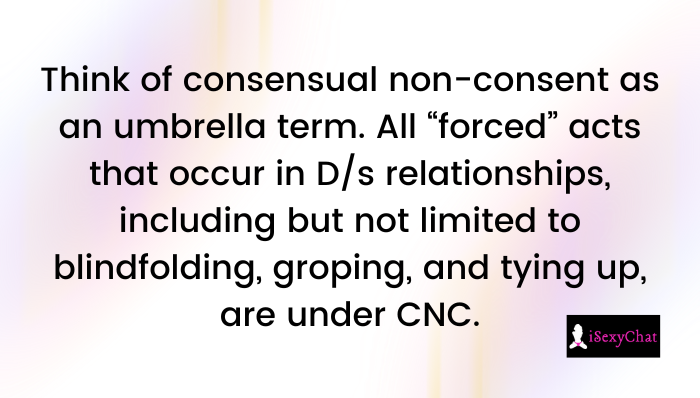
Non-sexual CNC
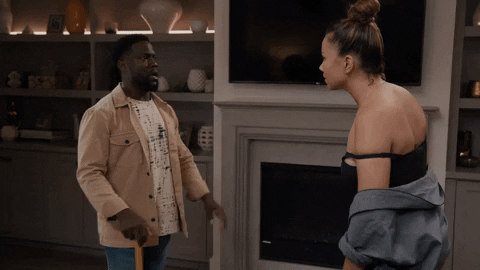
You might also be surprised to know that CNC isn’t all about the kinky stuff. There are CNC acts that aren’t sexual in nature, such as enforcing punishments outside of the bedroom.
Physically overpowering a sub isn’t a prerequisite to CNC either. There are times when instilling mental or emotional force can be enough to get a dom off. You and your partner can pretend to be fighting spouses where one is overpowered by another, a burglar’s encounter with the homeowner, or maybe even a slave auction with other willing participants.
Other roles are not so subtle in their power dynamic. Think relationships like daddy/mommy, pet/owner, and slave/master a little more straightforward when it comes to who’s who.
Somnophilia

One of the most common forms of CNC is somnophilia. It’s a kink where a dom does whatever he pleases to the unconscious sub who is sleeping, drugged, or otherwise. Think Sleeping Beauty.
Somnophilia shouldn’t be performed without the sub’s consent, so unless you want to be labeled a rapist, best ask for permission beforehand.
TPE

Total power exchange (TPE) relationships take it one step further. In this 24⁄7 set-up, the D/s relationship has spilled over from the bedroom into real life.
TPE is an agreement wherein a sub is under the dom’s absolute control without exception—from physical to emotional to mental to financial. Outside the bedroom it can look like controlling the sub’s bank accounts, choosing the sub’s clothes, ordering for the sub’s every meal, and more.
From an outsider’s perspective, TPE can look a lot like abuse, which is why we recommend only people who’ve known each other for a while get into one. Otherwise, you’re better off doing one-night stands.
The Risks in Consensual Non-Consent
It’s not unheard of for sexual assault or rape survivors to enjoy the CNC kink. It might seem contradictory. But if you think about it, re-enacting how the situation was like allows them a safe space to take ownership of the situation.
It’s a way to gain psychological mastery over what has happened to them in the past. For once, they are empowered instead of powerless. They know no harm will truly come their way. One article coined it as a “way to relieve the experience, knowing that they now have the power to make it stop.”
Another sexual assault survivor said it was “cathartic” to engage in CNC. It has provided her “an internal sense of peace and acceptance that years of PTSD therapy never gave [her].”
It could be argued that CNC does glorify rape. For other sexual assault or rape survivors, they cannot bear the thought of their traumatic experience being turned into a shallow erotic fantasy. It’s a very real trigger that shouldn’t be taken lightly or even brought up to those who have experienced some form of abuse in the past.
There is no singular, correct way to heal from trauma. Every human will need a different method. However, at the end of the day, CNC isn’t promoting how more people should start raping each other.
On the contrary, the people who are into forced sex will commit to the fantasy in a safe and controlled manner, which is what BDSM is also about. If you think about it, the use of whips and gags is enough to traumatize anyone. But the BDSM community isn’t as concerned about whether or not these equipment are ethical or moral.
There’s no denying that CNC is risky. But so are the hundreds of other BDSM kinks and fetishes out there, so might as well go for it as long as you’re in a well-informed position of the risks to do so.
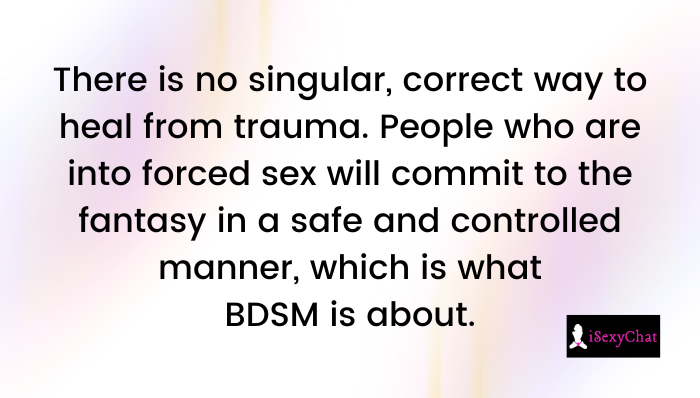
Overstepped Boundaries
Using CNC as a coping mechanism is fine. However, the nature of the set-up also makes it terribly easy to overstep boundaries. And this is why a sub should only enter this agreement with a dom they already trust.
It’s not just the physical abuse we’re worried about, either. Taking advantage of someone’s trust can really take a toll on their psychological well-being. It might even result in panic attacks or traumatic flashbacks.
Testing your limits is the name of the game, but because of the very nature of this task, it can be complicated to know what or where exactly your limit is.
Subs live to please doms, but uttering the safeword can feel a lot like tapping out, which can result in guilt and disappointment on both ends. There’s nothing worse than sex ending with both of you feeling bad about what had just happened.
Because of how intense a CNC kink scene can be, it’s also likely that a sub will end up forgetting the safeword, especially if it’s not common enough to be recalled on the spot.
This makes it more important to have a trustworthy partner. They must know you well enough to detect when something’s not right through non-verbal cues like bodily movements or facial expressions.
It helps to start slow and work your way up to more intense scenes. Not everything has to be established all at once lest you and your partner risk being overwhelmed.
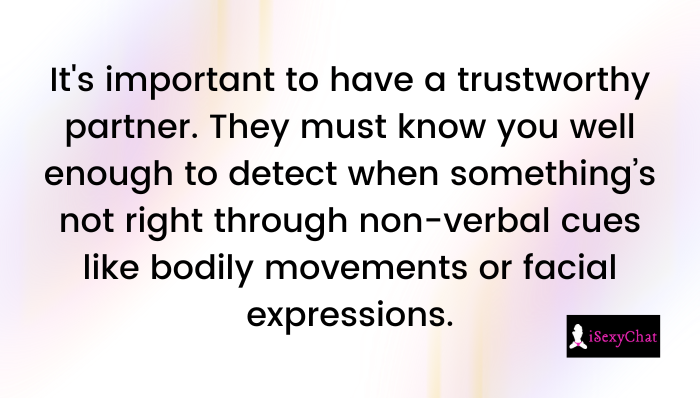
The Rule of Law
Some people would argue that consent is automatically retracted the second the person is unconscious. Kink is based on constant consent, they said. And if this can’t be achieved then it becomes sexual assault.
There isn’t a safe way to medicate to the point of unconsciousness that the sub wouldn’t wake up from during sexual activity. It isn’t wise to drug someone for real either way.
You also need to consider local laws. In many jurisdictions, you can’t legally give consent to being drugged, assaulted, and raped. No matter how many protests there are that it was consensual, in the eyes of the law and your peers, you drugged and raped a woman. If someone overhears a CNC kink scene and believes you’re being harmed, the police won’t need or request a warrant to enter your property.
Avoiding Sexual Assault Through Safewords
What does it mean in a D/s relationship to say “no”?
When subs say no, it can be tricky to interpret what they mean. Are they intentionally acting like a brat or are they slowly approaching a hard limit? Even if they say no, does it mean they’re okay with you continuing whatever you’re doing? This is consensual non-consent, after all—everything is fair game.
Until safewords enter the picture.
It is highly encouraged for CNC kinksters to always have a safeword or two. One to mean “stop the scene entirely” and another to mean “change what is happening.” The most common safewords are the traffic light system (green, yellow, red). But it’s up to you to get creative as long as you talk about it prior to the actual session.
If the sub expects to be gagged, make sure to come up with a gesture or other non-verbal safeword as a backup. Some will even go as far as to draft a written contract between dom and sub just to ensure that boundaries are understood and respected.
D/s relationships aren’t required to have a contract on hand, but it does help give a sub that peace of mind that the dom will not overstep at any time. More on this in the later section.
You might find some D/s relationships refusing to use a safeword altogether. They feel like a safeword provides a sub with too much power, which defeats the purpose of the set-up. This is a morally gray area for a lot of folks in the BDSM community. But as long as both parties have agreed to this, the agreement can still qualify as consent at the end of the day.
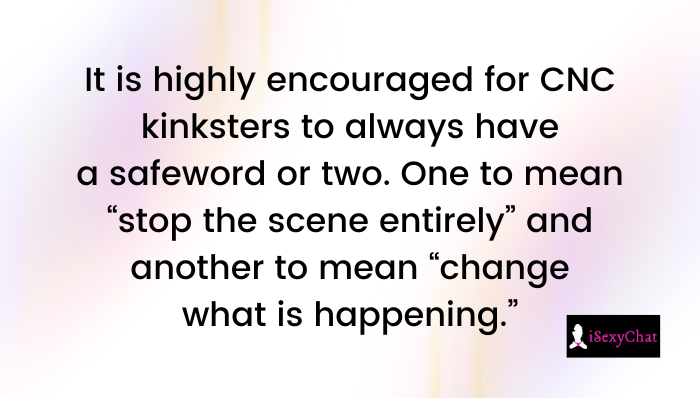
Setting Up The CNC Scene
Not everyone can take part in CNC. We’ve always stressed the importance of trust and communication in bed, even for the vanilla crowd, but indulging in this kink takes this requirement to a whole new level.
In order to be crystal clear about boundaries, a written contract is due.
Drafting the contract
The first step is the longest step for the sole reason that the success of consensual non-consent is hinged on the many, many discussions that come before the session proper. Most partners will agree to a set of terms and limits beforehand, which can be renegotiated if it becomes necessary.
There’s no set contract for D/s relationships, but some of the most common ones include the following: the terms of the arrangement, the rights and responsibilities of each party, the soft and hard limits, the rewards and punishments, and the confidentiality of the clause.
Of course, the contract doesn’t have to be written in a way that’s overly technical or legalistic. Keep it simple and straightforward. There are also a number of BDSM contract templates you can find online for free—best for first-timers who might be in need of guidance and want to cover all bases.
Partners are encouraged to be as meticulous as possible in the contract. For example, you can specify that you’re allowing yourself to be penetrated by a butt plug, but not a butt dildo. You might like getting slapped on the face, but spanking is a different act altogether.
Other negotiations worth bringing to the table are matters of bondage, sex toys, marking, and even contraceptive use. Never assume your partner knows what your boundaries are unless it’s explicitly said.
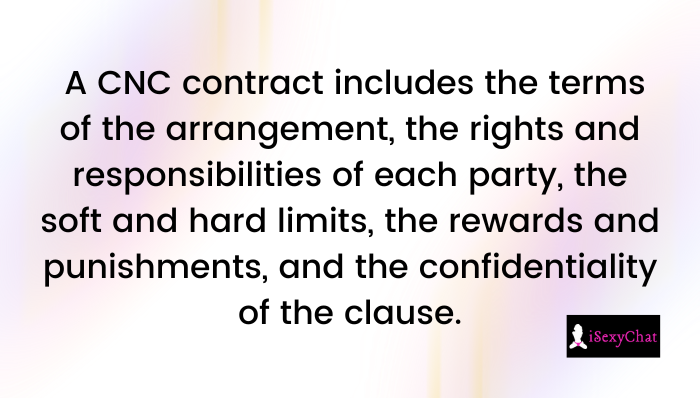
Playing the scene
As mentioned earlier, there isn’t one way to do CNC. Props, costumes, and toys are always welcome, but not necessary to have a good time. At the very heart of this kink is the love for roleplaying where everything goes as long as CNC elements are incorporated into it.
Like any other skill, inhabiting a particular role takes practice, so don’t feel ashamed in your struggle to get into the headspace. It takes time. An article by Bustle put it like this: “They’re spaces to explore new sides of yourself, experiment with new identities, and put on a role that might be in total conflict with your everyday life.” This is precisely how feminists can still have a rape fantasy and not experience total dissociation among themselves.
CNC fosters a safe space, but that doesn’t mean you can go around and roleplay wherever you please. Exhibitionism and CNC rarely mesh well together, considering that concerned onlookers might be prompted to intervene or call the police upon seeing coerced activity.
If you are to kidnap your sub, common sense will tell you not to do it in broad daylight in a supermarket parking lot. Not even a real kidnapper would be dumb enough to do so, so why should you as a roleplayer? That said, avoid drawing unwanted attention and best keep CNC acts in private spaces.
Not a fan of elaborate planning? No problem. According to the blog Bound Together, an organic CNC scene—that is, not having planned or negotiated a roleplay before it happens—can be possible for more established dynamics.
There are benefits to having done CNC under the same contract in the past: each session allows you and your partner to get to know each other more on a deeper and more experiential level. Anyone with a D/s experience would know that what is agreed upon before the session doesn’t usually hold. Soft and hard limits can be changed the moment it’s beginning to get tested, so it can be dangerous for new people in the CNC lifestyle to do it spontaneously from the get-go.
In some cases, these CNC arrangements have an element of the unknown between partners for that extra thrill. You might not know when or how your partner will “rape” you, only that it will happen.
This brings unparalleled excitement to the person who receives sexual gratification from being preyed upon. Learn to reignite the sparks with tried-and-tested methods. It also goes without saying these organic CNC scenes are not the time to try out a new sexual act that could result in lost trust.
Remember: make sure you and your partner are on the same boat. Don’t enact an organic CNC without 100% knowing for sure that your partner will be on board with you.

Providing aftercare
The CNC session doesn’t end with orgasm—far from it. In a D/s relationship, aftercare is just as important as the play itself because of how intense the experience can be.
It might seem silly, but establishing proper aftercare before a session is also highly encouraged! Aftercare can mean differently for a lot of people—many prefer being cuddled to sleep, some validated or praised for doing a good job in bed, while others like being left alone to process everything that has just happened.
You might encounter subs whose boundaries have been pushed to the extremes withdrawing from you after an intense session. This is somewhat normal in a D/s relationship given the consented abuse a sub has to endure. You might get feelings of shame or guilt afterward, but withdrawing back as a response is the worst thing you can do as a dom.
Allow them to process on their own, but make sure to be there for them when they’ve recovered. It can also help to debrief the scenes played out, starting off with the following questions for both dom and sub:
- What did I do wrong or right?
- How could have it been a more pleasurable experience for you?
- What did you feel when I did this/that?
- Was there a time you didn’t say the safeword but wanted to?
